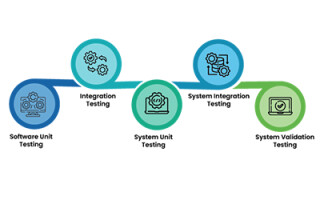What's next for microcontrollers?
February 01, 2010

MCUs involve more than just cores – integrated memory and smaller packaging are also part of the innovation going on, as well as tools and devel...
MCUs involve more than just cores – integrated memory and smaller packaging are also part of the innovation going on, as well as tools and development kit support.
Another way to simplify the development process is through graphical programming interfaces that allow designers to program by manipulating representations of icons and graphics rather than actually writing the programming language. These graphical coding environments are being driven by the hobbyist community, as well as a new generation of engineers learning on platforms such as LabVIEW and Simulink. Companies like VisSim are taking this even farther by working on ways to totally remove the programming language and let the engineer focus on the algorithm or system model.
Modular tools
Modular hardware development tools have been around for a while in some form or another. Today, it is most cost-effective for developers to leverage a hub-type board around which they can place different functional or application-based modules to accurately explore the peripherals and evaluate the capabilities of that processor for a specific purpose. This allows developers to shorten development time by focusing on their specific needs for an MCU instead of learning everything about the device to design a specific prototype system. The modularity also allows developers to easily upgrade to higher-performance MCUs within the platform. One example of modular hardware development tools is TI’s controlCARD system (Figure 2) for TMS320C2000 MCUs, often used in real-time control applications.
Hub boards can provide fully functional evaluation modules. This trend also emerges from the increasing number of engineers who do not specialize in MCU development or their specific application. They know enough to finish the prototype phase, but constrained schedules do not afford them the time to become experts on silicon. New applications like LED lighting, varying types of motor control, and digital power control are driving these new kinds of development kits.
For application-specific kits such as those used for motor control, developers require proven, real-world designs that allow them to easily port and debug code. To ease this process, TI implements an incremental build approach to its controlSUITE software, which allows an incremental section of code to be built so that the developer can verify each section of the application one step at a time. This is critical in real-time control applications that involve many variables that can affect the system.
Open everything
Another trend for the development environment is the move to open everything – open source development software, open hardware and tool design files, open application platforms, open source compilers and board support libraries, and pretty much everything else between the user’s PC and the chip itself. Software environments like Processing, Eclipse, and the GCC tool chain have gained momentum and begun to accelerate their development accordingly to keep pace with silicon. Not only does this empower current customers to personalize the tool chain to their needs, it also decreases the factory support necessary for many end users. Combine this with more intuitive MCU installers and frameworks plus rapidly developing online communities and social networks, and it is clear that the entire development system is in the middle of a rapid evolution to openness.
All of these trends are coming together to inspire confidence in MCUs’ ability to continue improving many of the products we have today and foster new ideas and solutions that will help engineers solve tomorrow’s problems.
Jacob Borgeson is a product marketing engineer for the Microcontroller business at Texas Instruments. He works with universities and TI engineers to enable high-quality educational environments and next-generation products through directed research. Jacob holds a BS in Electrical Engineering and an MBA from Texas Tech.
Texas Instruments
713-513-9576
[email protected]
www.ti.com






